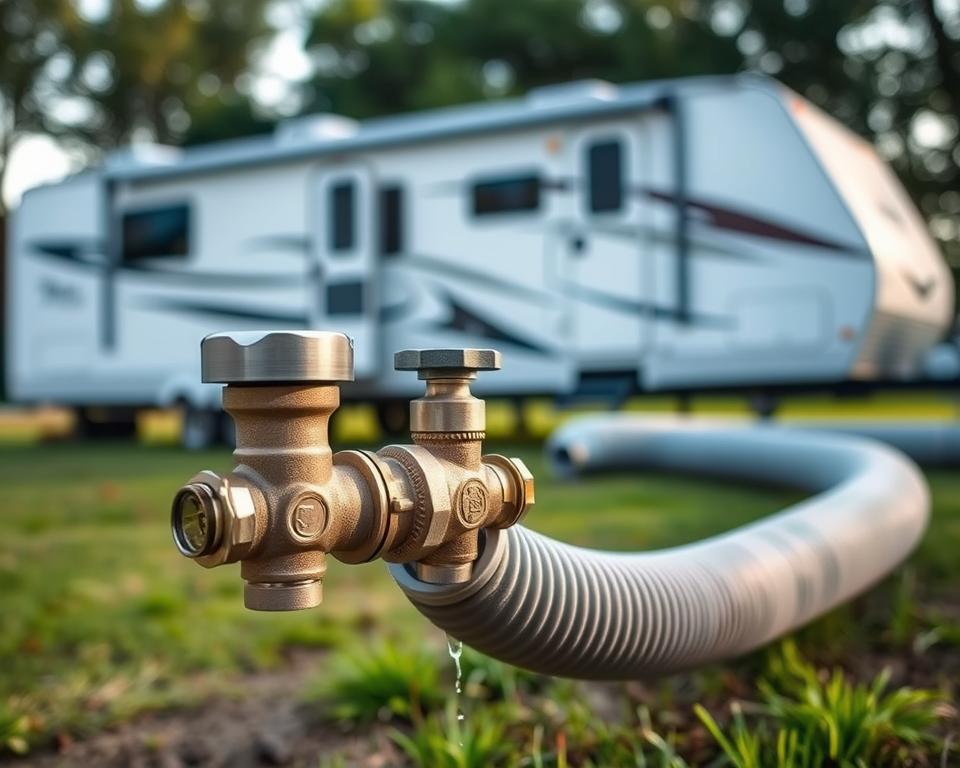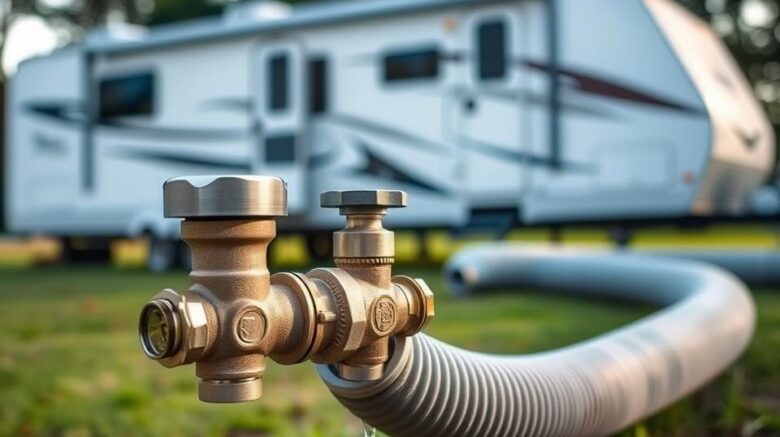Must-Know RV Septic Tank Service Care Tips
Have you ever thought about what takes place to your RV’s Septic tank when you’re rolling down the highway? It’s about more than steering clear of nasty odors. Maintaining your RV Septic tank in good shape guarantees smooth travels. A regularly serviced system avoids messy mishaps and costly repairs. Yet, many neglect this critical care. In this guide, we break down the importance for regular RV septic pumping. We’ll highlight the value of upkeep and provide tips for cleaning your recreational vehicle’s Septic tank. Get ready for carefree adventures!
Principal Learnings
- Scheduled RV Septic tank service is essential for optimal performance.
- Grasping your RV Septic system assists sidestep costly repairs.
- Routine maintenance stops unpleasant odors and clogs.
- Establish a pumping schedule based on your usage.
- Practice best practices for dumping your holding tanks.
- Steer clear of common mistakes to prolong the life of your Septic system.
- Understand when to call for professional help for Septic services.
Understanding RV Septic Systems
An RV Septic system is essential for any camper. It includes multiple holding tanks that handle waste effectively. You’ll find three critical tanks in an RV: the fresh water, the gray, and the black tank. The fresh water tank delivers clean water for drinking and cooking. Meanwhile, the gray tank collects wastewater from sinks and showers, promoting cleanliness. The black tank, specifically for toilet waste, also has a vent to minimize odors.
Preserving a healthy camper sewage system calls for understanding how these parts work together. Routine checks of the tank levels are necessary to avoid overflow and guarantee everything runs properly. Getting to know the termination valves is important too. These valves are central in efficiently managing waste disposal. By understanding these components, you can keep your RV in great shape and relish your travels without any unnecessary trouble.
| Reservoir | Purpose | Volume |
|---|---|---|
| Fresh Water Tank | Supplies drinking and cooking water | 30-100 gallons |
| Gray Tank | Stores wastewater from sinks and showers | 30-60 gallons |
| Black Tank | Stores toilet waste | 30-50 gallons |
Importance of Regular RV Septic Tank Service
Consistent RV Septic tank service is central to keeping your system effective and long-lasting. Without proper maintenance, you could face system failures, foul odors, and costly repairs—issues that disrupt your adventures.
Overlooking the upkeep of your RV’s Septic system may cause it to back up. This not only impacts your RV’s function but also your comfort levels. A clean and maintained system is essential for smooth trips, offering you a peaceful travel experience.

Ongoing maintenance lengthens your sewage system’s lifespan and maintains a clean living space. Watching your Septic tank helps you detect issues early. This foresight reduces costs and stress, providing you confidence during your journeys.
Ideal RV Septic Tank Pumping Schedule
Determining the right schedule for RV Septic tank maintenance depends on the vehicle’s usage. For those continuously on the road or residing in their RVs, it’s recommended to drain the black tank every 3–5 days. This practice ensures cleanliness and avoids unexpected issues during voyages.
Weekend adventurers can usually wait until they return home to pump their Septic tank. Leaving waste in the tank too long, though, can cause build-up that hinders the tank’s function and smell control. It’s important to monitor the tank’s level closely, readying for disposal once it hits ≈66% full to keep everything running efficiently.
The capacity of your Septic system, along with how you use your RV, will dictate when to pump. Understanding these aspects improves your RV’s performance and minimizes the dangers of poor waste management.
| Usage Pattern | Ideal Pumping Cadence | Urgent Pumping Indicators |
|---|---|---|
| Frequent Usage | Every 3-5 days | Tank is two-thirds full |
| Weekend Trips | After return home | Unpleasant odors or slow drainage |
| Extended Trips | Every 2-3 days | Gauge shows near full |
Best Practices for Emptying RV Holding Tanks
Effectively managing a recreational vehicle’s holding tanks is essential for a comfortable camping experience. Always start by draining the black tank first. This strategy lets the gray water to flow through and rinse out the hose. Be sure the use of a high-quality sewer hose for a secure connection and to cut spills. Once the tanks are emptied, fully flushing the black tank is important. Running a built-in black tank flush or comparable alternatives can significantly reduce residue.
After the emptying process, it’s essential to close both valves firmly. This action is vital to sustain a fully operational Septic system. Additionally, RV owners must rely on dump stations properly and follow local laws. Routine cleaning practices for recreational vehicle Septic tanks are key. They maintain the system’s optimal functionality and avoid future odors.
Keeping Your RV Fresh: Odor & Clog Prevention
To tackle odors and stop clogs in your RV, careful attention is key. The task begins with verifying enough water in the holding tanks. Adequate water assists in breaking down waste efficiently, cutting bad smells.
Selecting suitable toilet paper is essential in this process. Opt for RV-safe toilet paper that disintegrates quickly, preventing clogs. This simple adjustment considerably aids in maintaining seamless waste flow.
Applying enzyme-based treatments can further boost waste decomposition and odor control. These natural solutions help keep your RV smelling fresh. It’s also vital to regularly examine vent pipes for obstructions to maintain good airflow and stop odors from infiltrating your living area.
Errors to Dodge in RV Septic Maintenance
Looking after your RV’s Septic system the right way is essential for its effectiveness and longevity. When non-biodegradable items like wipes or feminine products are flushed, they can cause significant blockages. These blockages can cause various problems that are difficult to resolve.
Not using enough water when flushing can also damage the system. It causes waste buildup, resulting in foul smells and potential damage. Furthermore, a common mistake at full hook-up sites is leaving the black tank valve open. This causes waste to accumulate at the tank’s bottom.
Preventive measures involve consistently flushing and rinsing tanks after emptying them. Ignoring maintenance can escalate into significant issues requiring pricey repairs. Being prepared and knowledgeable safeguards both your RV and your finances.
Calling in the Pros for RV Septic Service
Knowing when to seek professional RV Septic services is essential for preserving a healthy Septic system. Some clues suggest the need for expert intervention. If you notice slow-draining tanks or experience persistent foul odors wafting from your RV, it is wise to act promptly. These signs often reveal underlying issues that require a thorough Septic tank service for resolution.
Visible leftover waste after emptying can also show problems within your Septic system. This situation may not fix with routine maintenance and may require the use of specialized equipment. Professionals are prepared to tackle complex challenges with tools, such as high-pressure water jets, to ensure a thorough cleaning process.
Prompt professional assistance can make a significant difference. Minor troubles can quickly turn into more severe complications without proper care. Investing in professional RV Septic services helps the integrity of your system and prolongs its lifespan.
| Signs of Trouble | Suggested Response |
|---|---|
| Slow draining tanks | Contact professional RV Septic services for assessment |
| Persistent foul odors | Schedule Septic tank service for diagnostics |
| Visible leftover waste | Seek immediate assistance from a professional |
| Frequent clogs | Consider expert cleaning solutions |
Ensuring Long-Term RV Septic Health
Long-term care for RV Septic systems calls for attention beyond basic pump-outs. Carrying out deep cleaning of tanks every few months avoids buildup and prolongs system life. Inspecting dump valve seals on schedule avoids leaks. Additionally, sanitizing the system maintains it clean and functioning well.
It’s important to monitor tank sensors to confirm they work correctly. Incorrect readings may lead to over-filling, hurting performance. Routine sensor checks and adjusting maintenance schedules can stop this problem.
| Task | Frequency | Outcome |
|---|---|---|
| Deep Cleaning Tanks | Every 3-6 months | Stops residue accumulation |
| Inspect Dump Valve Seals | Monthly | Prevents drips |
| Sanitize System | Every 6 months | Makes sure system remains clean |
| Monitor Tank Sensors | Monthly | Guards against overflow |
Forward-thinking maintenance is vital to your RV Septic system’s long-term health. It sets up pleasant and seamless travel experiences.
All In Sanitation: Your Partner in RV Septic Solutions
All In Sanitation specializes at providing RV Septic services that meet each client’s specific needs. Whether it’s scheduled pump-outs or full tank cleaning, they grasp the vital role of a well-functioning Septic system in your RV’s performance.
Boasting extensive expertise in RV Septic systems, All In Sanitation delivers top-tier guidance on maintenance and care. Their team is knowledgeable in the particular challenges RV owners encounter and provides effective solutions when troubles arise.
Choosing All In Sanitation allows RV enthusiasts dive in their journeys, handing over Septic concerns to a reliable ally. Their dedication to excellent service brings tranquility and enhances the pleasure of adventures on the open road.
In Closing
Maintaining your RV Septic tank is critical for seamless travels. It’s necessary to grasp your system and adhere to regular services. This ensures you won’t face unexpected issues on your journey. These key steps involve frequent pumping and using sound waste management practices.
Thorough long-term care maintains your system in prime form. By implementing the provided maintenance tips, you can enhance your travel experience. This strategy helps avoid expensive repairs later. Bear in mind, sidestepping common errors and recognizing when to seek professional help are important.
In the end, being prepared in your RV Septic system’s maintenance secures a stress-free adventure. It allows you to zero in on creating lasting memories. So, take these steps to heart and savor your road trips to their fullest.
